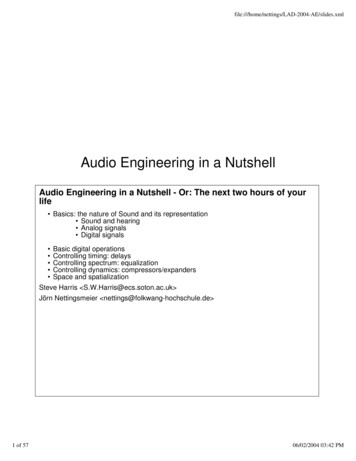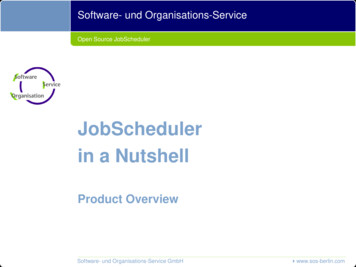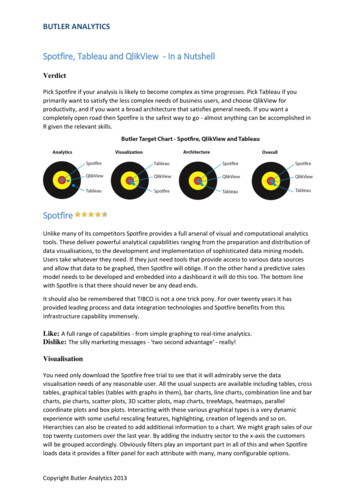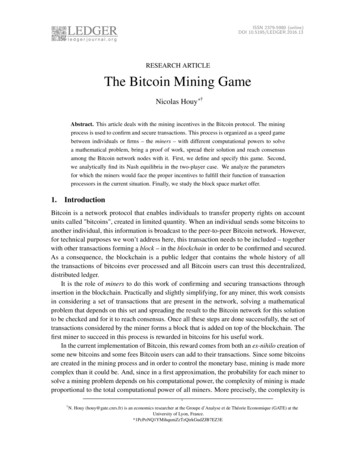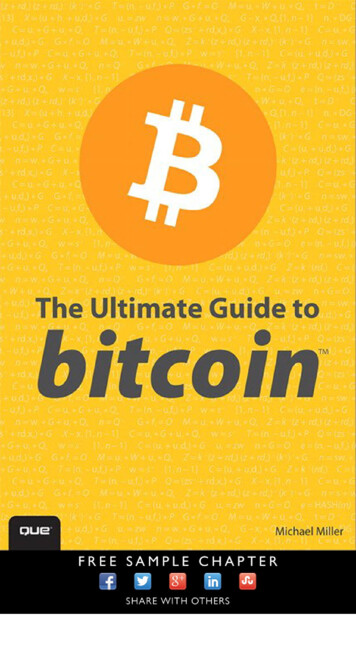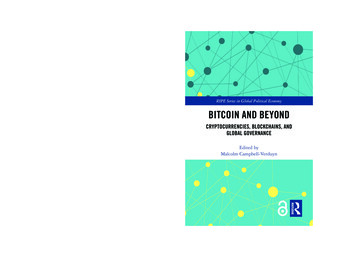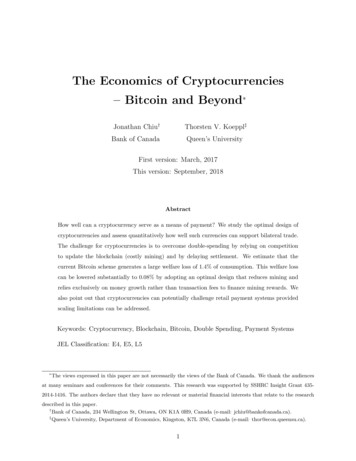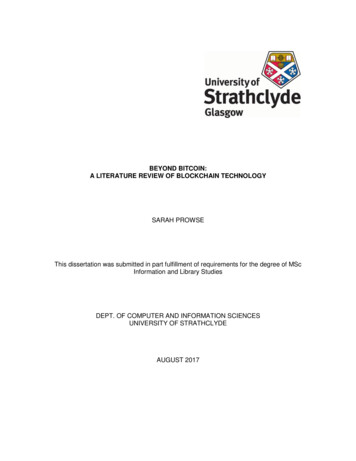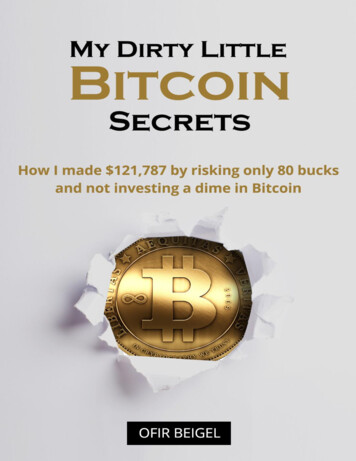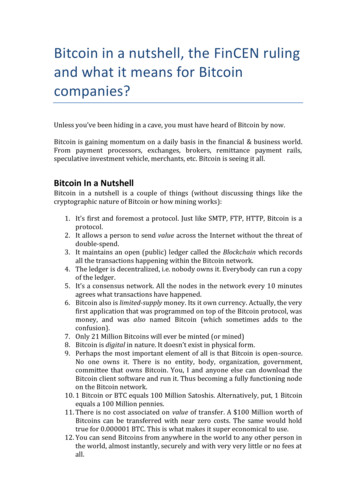
Transcription
Bitcoin in a nutshell, the FinCEN rulingand what it means for Bitcoincompanies?Unless you’ve been hiding in a cave, you must have heard of Bitcoin by now.Bitcoin is gaining momentum on a daily basis in the financial & business world.From payment processors, exchanges, brokers, remittance payment rails,speculative investment vehicle, merchants, etc. Bitcoin is seeing it all.Bitcoin In a NutshellBitcoin in a nutshell is a couple of things (without discussing things like thecryptographic nature of Bitcoin or how mining works):1. It’s first and foremost a protocol. Just like SMTP, FTP, HTTP, Bitcoin is aprotocol.2. It allows a person to send value across the Internet without the threat ofdouble-spend.3. It maintains an open (public) ledger called the Blockchain which recordsall the transactions happening within the Bitcoin network.4. The ledger is decentralized, i.e. nobody owns it. Everybody can run a copyof the ledger.5. It’s a consensus network. All the nodes in the network every 10 minutesagrees what transactions have happened.6. Bitcoin also is limited-supply money. Its it own currency. Actually, the veryfirst application that was programmed on top of the Bitcoin protocol, wasmoney, and was also named Bitcoin (which sometimes adds to theconfusion).7. Only 21 Million Bitcoins will ever be minted (or mined)8. Bitcoin is digital in nature. It doesn’t exist in physical form.9. Perhaps the most important element of all is that Bitcoin is open-source.No one owns it. There is no entity, body, organization, government,committee that owns Bitcoin. You, I and anyone else can download theBitcoin client software and run it. Thus becoming a fully functioning nodeon the Bitcoin network.10. 1 Bitcoin or BTC equals 100 Million Satoshis. Alternatively, put, 1 Bitcoinequals a 100 Million pennies.11. There is no cost associated on value of transfer. A 100 Million worth ofBitcoins can be transferred with near zero costs. The same would holdtrue for 0.000001 BTC. This is what makes it super economical to use.12. You can send Bitcoins from anywhere in the world to any other person inthe world, almost instantly, securely and with very very little or no fees atall.
Here is an excellent video by Andreas Antonopoulos on Bitcoin (YouTube Video):https://www.youtube.com/watch?v c2CsJ2HMA2ILegalityBitcoin has taken the internet by storm. 1,000s of startups are trying to get anearly advantage on this great piece of technology and implement it in variousproducts & services. Central Banks & Financial Regulators worldwide arewatching with keen interest.Because of the revolutionary nature of Bitcoin and how it can easily enablemoney to move, governments worldwide are cautious. Some have embracedbitcoin, others are waiting on the sidelines.Some governments have taken a knee-jerk approach to the threat of Bitcoindestabilizing their monetary systems or by-passing the regulatory systems formoney movement & monitoring and have outright banned it or deemed it illegalto trade (countries like Bangladesh, China, Russia, Mexico, India, etc). SeeLegality of Bitcoin by Country.Countries who are embracing Bitcoin, are essentially ignoring the Bitcoin price,i.e. the prevailing market rate, but instead are more focused in understandingand appreciating the Bitcoin “ the technology, the invention and the network itcreates” (Andreas Antonopoulos)Developed markets like the US, Germany, UK, Canada, etc. have started to workwith the Bitcoin Foundation and Bitcoin companies to get a better understandingif, how and when they need to be licensed.Recent FinCEN RulingThe US Financial Crimes Enforcement Network (FINCEN) released its opinionson: Request for Administrative Ruling on the Application of FinCEN’s Regulationsto a Virtual Currency Payment System and Request for Administrative Ruling onthe Application of FinCEN’s Regulations to a Virtual Currency Trading Platformyesterday (27th October 2014).The ruling which is an update to an earlier ruling of October 2013, in which onlyBitcoin Exchanges were subject to the Money Transmitter Rules, exempted othertypes of businesses from being categorized as money transmitters.With the new ruling, it seems that Bitcoin Brokers and Merchant processorswould now also need to be licensed and obtain Money Transmitters Licenses inthe States where the Bitcoin companies intends to source clients from.This would not bode well for the likes of Coinbase, Bitpay and Circle, companieswho have insisted that they are exempt from Money Transmitter Licenses as perthe earlier FinCEN ruling.
Now that FinCEN has issued new guidelines what remains to be seen, whataction would the individual department of banking & financial services (orequivalent) in each State do? Would they issue a cease & desist notice to theexisting players? give them a temporary pass till such time they are licensed?If the States do not give a temporary relief to these companies then it would haveserious repercussions on their daily trade volume and company valuations.I have a sinking feeling that the regulators, especially FinCEN will also go afterexchanges that are outside the US and yet picking up business from the US. Theonly clear winner in this battle of regulatory compliance with having theassociated licenses is CoinX, a stealth startup based out of Atlanta, GA, that has30 related money transmitter licenses.For other startups, this news could not come at a worse time. These companiesnow have to pony up the capital to apply for licenses, increase their net worth,find surety bonding and insurance so that they can qualify for license application,a process which can take many many months.Are you affected by the Ruling?One of the first questions you have to ask yourself is if you are affected by therecent ruling. You may need to seek a legal opinion (or two, or three) and bequite certain about the direction the opinion leans towards: Get Licensed? orNot Applicable to you?Do not rely on the opinion of a single lawyer, no matter how good he/she/theymay be. At the risk of being blunt, it is times like these that law firms andattorneys juice their clients. Get a 2nd and 3rd opinion (if necessary).Does the Ruling affect your current operations/plans?Are you yet to go live or are you live? If you’re yet to go live, you have your fairshare of work carved out for you. If you were live and engaged in commercialtransactions, the ruling could mean problems for you. You may need to stopcommercial transactions all together. This can be devastating for some. If youhave a large payroll to deal with, or monthly recurring is high, you may want toconsider shedding the excess weight off, until you get licensed.Can you move operations overseas?For some businesses (emphasis supplied), the option to move operations (orbusiness) overseas and be able to continue, might just be possible. Just don’texpect to pick up transactions/clients from the US that easily.
Do remember, as per FinCEN ruling of 2011, includes Foreign-Located MSBsdoing business in the US. (See:http://www.fincen.gov/news room/nr/pdf/20110715.pdf).So, by merely transitioning overseas, don’t expect you would be able to pickupUS clients.How long does licensing take?The answer is not so simple. On average, the 50 States will take you between 1-3years. For a few states you might be able to secure licenses in 3-5 months, butthen again, how many of your clients are walking about in Utah or North Dakota?States like Illinois, New Jersey, Florida, Massachusetts, Pennsylvania, etc. hoverbetween 6-10 months. Heavy weights like Texas, New York and California, easily1 to 1.5 years (if not more). For example, if CA does view your application andfinds out your Audit has expired and wants you to redo an Audit, that can easilyextend the time.For NY you will have to get the BitLicense when it comes out. CA might offer itsown BitLicense equivalent. Texas so far has no plans – or do they? One cannot besure. They don’t advertise much. Everyone is playing the ‘wait and see’ gamewith how NY’s DFS handles the BitLicense.Those who have applied, will testify that the process is brutal and frustrating attimes; one that requires money and patience (in that order) and a tad bit of goodluck.What problems can one face?No action by the Regulator weeks after you submitted your application. Addeddelays. Audit report not acceptable. No Commissioner to sign-off yourapplication. Associate to go through your application not awarded. Missinginformation, please refile again. Missing fingerprints, please refile. Applicationbeing returned, please go through checklist as attached again (a lot of elementsare not correct or missing).Shampoo. Rinse. Repeat.Then there are the highly important Surety Bond Providers. Surety Bondcompanies that the State Regulators can work with, is a small bunch, about 16 orso of them. You have to deal with their appointed agents who then providesurety bonding to you. Because you are Bitcoin, they may or may not decide todo business with you. If they all deny you (a very very strong possibility) thenyou’re as good as dead. Many States will not take any other form of a SuretyBond (like Certificate of Deposit, Cash, etc.)They all work in collusion. I have no fear in citing this. You’ll find out. There aresome Agents whom you should avoid like the plague, but then again, you willexperience this yourselves.
Audit (Security Audits, Financial Audits) are a pain and cost a lot of money. Somewill be outright rejected after the audit is done. Why? Because the person whoconducted the audit is on the regulator’s shit list. But they won’t tell you so.They’ll just reword it and let you know that you need to find another auditor towork with.Banking is also going to be one of your biggest woes. You’d be hard pressed tofind a bank that will work with you once they find out you are a licensed moneytransmitter. Even the bank accounts you have can be closed without warning. Infact, Banking is one of the biggest challenges after licensing.The pain points are many. Be prepared. Don’t say I didn’t tell you so.How much Money?Plan on having lots of it. The whole licensing experience is all about spending alot of money. Lawyers. Net Worth. Permissible Investments. Surety Bonding.Insurance. Audits. Auditor Fees. Specialists Fees. Etc.If you have to raise this money, it will be difficult. Raising the necessary financeitself will add to the time period.Can I become an Authorized Agent of an existing MoneyTransmitter License holder?Sure you can. Theoretically this is possible. Practically, the value of a moneytransmitter license just went through the roof after the FinCEN ruling.A couple of years ago, you would work with the like of Obopay (now it’s prettymuch dead). PreCash isn’t doing anything in the Bitcoin space.Incomm will onlymake you an Agent if you are promoting their products and that too is a sketchy‘if’. Meracord won’t touch Bitcoins. Large FX or Money Transfer Companies thathave Money Transmitter Licenses will just not work with Bitcoin companies.You would be hard-pressed to find money transmitters in this space. One name Ican provide that you can talk to is Megan Burton’s CoinX (www.coinx.com). Shehas licenses in 30 States for money transmission related to Bitcoin.Can I work with a Nationwide Chartered Bank by OCC?Sure you can. A nationally chartered bank by the OCC is exempt from MoneyTransmitter Licenses, but then again, how many banks do you think would liketo work with Bitcoin related companies. If you find one. Hide it. Its a keeper.Don’t let anyone know.The road to licensing is not easy. A few companies like CoinX had the vision to goand get licenses earlier on. Others were very sure of themselves based on the
previous FinCEN ruling. Needless to say, the way things are right now, it seemsclear the Federal government has paved the way for States to declare you asmoney transmitters, and would not want you to pursue that path as well.Its going to be tough. You will feel like giving up. You might just go broke. Butdon’t give up. There is light at the end of the tunnel.By Faisal KhanFaisal Khan is a payments consultant & digital money evangelist. He is the co-hostof Around the Coin, a weekly podcast on Banking, Money & Payments and is alsothe resident payments expert on Quora. Faisal specializes in the design, solutionarchitecting and validation of Payment Systems & Networks based on the currentpayment rails, and on advance rails such as Bitcoin, etc. His speciality is in thedesigning of cross-border payment networks & systems. He can be contacted at:fk@faisalkhan.com
much dead). PreCash isn’t doing anything in the Bitcoin space.Incomm will only make you an Agent if you are promoting their products and that too is a sketchy ‘if’. Meracord won’t touch Bitcoins. Large FX or Money
